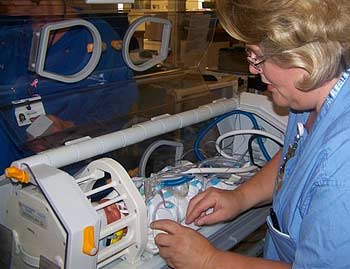By: Deborah Johnson Wood
Helen DeVos Children's Hospital added a revolutionary new medical device to its neonatal intensive care unit (NICU), providing cutting-edge technological capabilities for the detection of brain injuries or abnormalities in even the smallest babies. Only ten units are in operation in the United States.
 The $500,000 Neonate Imaging Sub-System (NISS) is a "NICU on wheels," an incubator that enables fragile preemies to safely undergo MRI brain scans. In the past, the transport and scan presented extreme risk to the infant.
The $500,000 Neonate Imaging Sub-System (NISS) is a "NICU on wheels," an incubator that enables fragile preemies to safely undergo MRI brain scans. In the past, the transport and scan presented extreme risk to the infant.
"This unit allows infants to travel from their home incubator in the NICU to the MRI imaging area without being exposed to the elements," says Dr. Brad Betz, medical director of radiology. "It has everything these amazingly fragile babies need to remain stable: a ventilator, monitors, plus an incubator to maintain body temperature."
A NICU caregiver places the infant in the NISS, connects them to the ventilator and monitors, and wheels them to the MRI. The incubator with the infant in it is placed in the MRI, and the caregiver monitors the infant's vital signs during the scan.
The MRI coils in the NISS fits a preemie's tiny head and produce extremely detailed brain images.
"One of the most devastating injuries is brain injury, and up to half of very early preemies have some kind of learning disability," Dr. Betz says. "We treat about 1,200 preemies a year, and they all get at least two head ultrasounds, but ultrasounds don't pick up details. Now we'll be able to recognize problems and get them proper care so they recover faster."
Source: Brad Betz, MD, Helen DeVos Children's Hospital
Photo courtesy of Helen DeVos Children's Hospital
Deborah Johnson Wood is development news editor for Rapid Growth Media. She can be contacted at [email protected].
Enjoy this story?
Sign up for free solutions-based reporting in your inbox each week.